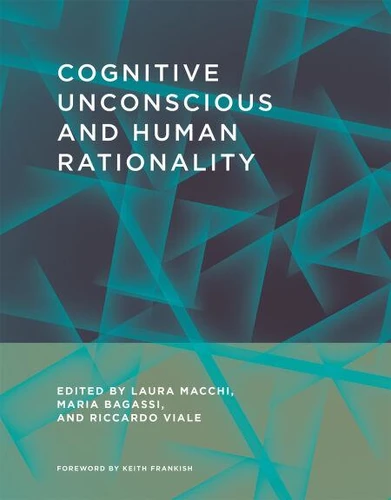Cognitive Unconscious and Human Rationality
Par : , , ,Formats :
Disponible dans votre compte client Decitre ou Furet du Nord dès validation de votre commande. Le format ePub protégé est :
- Compatible avec une lecture sur My Vivlio (smartphone, tablette, ordinateur)
- Compatible avec une lecture sur liseuses Vivlio
- Pour les liseuses autres que Vivlio, vous devez utiliser le logiciel Adobe Digital Edition. Non compatible avec la lecture sur les liseuses Kindle, Remarkable et Sony
- Non compatible avec un achat hors France métropolitaine
 , qui est-ce ?
, qui est-ce ?Notre partenaire de plateforme de lecture numérique où vous retrouverez l'ensemble de vos ebooks gratuitement
Pour en savoir plus sur nos ebooks, consultez notre aide en ligne ici
- Nombre de pages408
- FormatePub
- ISBN978-0-262-33512-6
- EAN9780262335126
- Date de parution11/03/2016
- Protection num.Adobe DRM
- Taille2 Mo
- Infos supplémentairesepub
- ÉditeurThe MIT Press
Résumé
Examining the role of implicit, unconscious thinking on reasoning, decision making, problem solving, creativity, and its neurocognitive basis, for a genuinely psychological conception of rationality. This volume contributes to a current debate within the psychology of thought that has wide implications for our ideas about creativity, decision making, and economic behavior. The essays focus on the role of implicit, unconscious thinking in creativity and problem solving, the interaction of intuition and analytic thinking, and the relationship between communicative heuristics and thought.
The analyses move beyond the conventional conception of mind informed by extra-psychological theoretical models toward a genuinely psychological conception of rationality-a rationality no longer limited to conscious, explicit thought, but able to exploit the intentional implicit level. The contributors consider a new conception of human rationality that must cope with the uncertainty of the real world; the implications of abandoning the normative model of classic logic and adopting a probabilistic approach instead; the argumentative and linguistic aspects of reasoning; and the role of implicit thought in reasoning, creativity, and its neurological base.
ContributorsMaria Bagassi, Linden J. Ball, Jean Baratgin, Aron K. Barbey, Tilmann Betsch, Eric Billaut, Jean-François Bonnefon, Pierre Bonnier, Shira Elqayam, Keith Frankish, Gerd Gigerenzer, Ken Gilhooly, Denis Hilton, Anna Lang, Stefanie Lindow, Laura Macchi, Hugo Mercier, Giuseppe Mosconi, Ian R. Newman, Mike Oaksford, David Over, Guy Politzer, Johannes Ritter, Steven A. Sloman, Edward J. N. Stupple, Ron Sun, Nicole H.
Therriault, Valerie A. Thompson, Emmanuel Trouche-Raymond, Riccardo Viale
The analyses move beyond the conventional conception of mind informed by extra-psychological theoretical models toward a genuinely psychological conception of rationality-a rationality no longer limited to conscious, explicit thought, but able to exploit the intentional implicit level. The contributors consider a new conception of human rationality that must cope with the uncertainty of the real world; the implications of abandoning the normative model of classic logic and adopting a probabilistic approach instead; the argumentative and linguistic aspects of reasoning; and the role of implicit thought in reasoning, creativity, and its neurological base.
ContributorsMaria Bagassi, Linden J. Ball, Jean Baratgin, Aron K. Barbey, Tilmann Betsch, Eric Billaut, Jean-François Bonnefon, Pierre Bonnier, Shira Elqayam, Keith Frankish, Gerd Gigerenzer, Ken Gilhooly, Denis Hilton, Anna Lang, Stefanie Lindow, Laura Macchi, Hugo Mercier, Giuseppe Mosconi, Ian R. Newman, Mike Oaksford, David Over, Guy Politzer, Johannes Ritter, Steven A. Sloman, Edward J. N. Stupple, Ron Sun, Nicole H.
Therriault, Valerie A. Thompson, Emmanuel Trouche-Raymond, Riccardo Viale
Examining the role of implicit, unconscious thinking on reasoning, decision making, problem solving, creativity, and its neurocognitive basis, for a genuinely psychological conception of rationality. This volume contributes to a current debate within the psychology of thought that has wide implications for our ideas about creativity, decision making, and economic behavior. The essays focus on the role of implicit, unconscious thinking in creativity and problem solving, the interaction of intuition and analytic thinking, and the relationship between communicative heuristics and thought.
The analyses move beyond the conventional conception of mind informed by extra-psychological theoretical models toward a genuinely psychological conception of rationality-a rationality no longer limited to conscious, explicit thought, but able to exploit the intentional implicit level. The contributors consider a new conception of human rationality that must cope with the uncertainty of the real world; the implications of abandoning the normative model of classic logic and adopting a probabilistic approach instead; the argumentative and linguistic aspects of reasoning; and the role of implicit thought in reasoning, creativity, and its neurological base.
ContributorsMaria Bagassi, Linden J. Ball, Jean Baratgin, Aron K. Barbey, Tilmann Betsch, Eric Billaut, Jean-François Bonnefon, Pierre Bonnier, Shira Elqayam, Keith Frankish, Gerd Gigerenzer, Ken Gilhooly, Denis Hilton, Anna Lang, Stefanie Lindow, Laura Macchi, Hugo Mercier, Giuseppe Mosconi, Ian R. Newman, Mike Oaksford, David Over, Guy Politzer, Johannes Ritter, Steven A. Sloman, Edward J. N. Stupple, Ron Sun, Nicole H.
Therriault, Valerie A. Thompson, Emmanuel Trouche-Raymond, Riccardo Viale
The analyses move beyond the conventional conception of mind informed by extra-psychological theoretical models toward a genuinely psychological conception of rationality-a rationality no longer limited to conscious, explicit thought, but able to exploit the intentional implicit level. The contributors consider a new conception of human rationality that must cope with the uncertainty of the real world; the implications of abandoning the normative model of classic logic and adopting a probabilistic approach instead; the argumentative and linguistic aspects of reasoning; and the role of implicit thought in reasoning, creativity, and its neurological base.
ContributorsMaria Bagassi, Linden J. Ball, Jean Baratgin, Aron K. Barbey, Tilmann Betsch, Eric Billaut, Jean-François Bonnefon, Pierre Bonnier, Shira Elqayam, Keith Frankish, Gerd Gigerenzer, Ken Gilhooly, Denis Hilton, Anna Lang, Stefanie Lindow, Laura Macchi, Hugo Mercier, Giuseppe Mosconi, Ian R. Newman, Mike Oaksford, David Over, Guy Politzer, Johannes Ritter, Steven A. Sloman, Edward J. N. Stupple, Ron Sun, Nicole H.
Therriault, Valerie A. Thompson, Emmanuel Trouche-Raymond, Riccardo Viale



